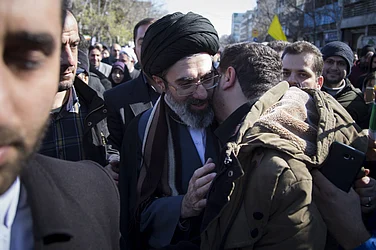The Red Sea is witnessing heightened tensions as Yemen’s Houthi rebel’s attacks on transiting ships escalate. Last week the Pentagon announced plans to expand its maritime force in the Red Sea to fight missile and drone attacks on passing vessels.
However, within less than a week of this announcement, France, Italy, and Spain have opted out of participating in the new force, initially expected to involve warships from over ten member nations, Al Jazeera reported.
Who are the Houthis?
The Houthis are an armed group from a sub-sect of Yemen's Shia Muslim minority, the Zaidis, formed in the 1990s. They originated in response to perceived corruption in then-president Ali Abdullah Saleh's regime.
The group has been engaged in a civil war since 2014 against Yemen's government, with support from a coalition led by Saudi Arabia and the UAE. The conflict has resulted in an estimated 377,000 deaths and has displaced four million people.
The Houthis align themselves with the Iranian-led "axis of resistance" against Israel, the US, and the wider West, controlling significant parts of Yemen, including the capital Sanaa and the Red Sea port of Hudaydah.
Why are they attacking the Red Sea?
The Iranian-backed Houthi rebels in Yemen have intensified their attacks in the Red Sea since the onset of Israel’s war on Gaza. While they would sporadically target ships in the region before, the frequency of these attacks has notably risen since October.
The Houthis’ political and military approach mirrors that of Hezbollah, a Lebanese group supported by Iran, engaged in attacking Israeli positions along the Lebanese frontier, and akin to Iraqi militias targeting U.S. interests in Iraq and Syria.
In an escalation of their warnings, the Houthis, on December 9, declared their intent to target all ships bound for Israel, irrespective of nationality. They cautioned all international shipping companies against engaging with Israeli ports.
“We will continue to prevent all ships heading to Israeli ports until the food and medicine our people need in the Gaza Strip is brought in,” the Houthi spokesperson said in a statement claiming responsibility for an unsuccessful missile strike on a Hong Kong-flagged ship on December 14, as per Al Jazeera.
“We assure all ships heading to all ports of the world apart from Israeli ports that they will suffer no harm and they must keep their identification device on.”
On December 23, the United States intercepted four Houthi drones heading towards a US destroyer, marking the 14th and 15th attacks by the Houthis on commercial shipping since October 17, according to US Central Command (Centcom).
On the same day US Naval Forces Central Command also received reports from two ships in the Southern Red Sea that they were under attack. One was a Nigerian-flagged chemical/oil tanker and the other was an Indian-flagged crude oil tanker.
The Liberian-flagged MSC Palatium III was the target of a drone attack on December 15. Although no injuries were reported, the vessel suffered fire damage and had to be taken out of service. Another Liberian-flagged vessel, Hapag Lloyd's Al Jasrah, was hit by a missile, Reuters reported.
The day before, Houthi rebels admitted to an unsuccessful missile strike on a Hong Kong-flagged ship, the Maersk Gibraltar. The ship was on its way from Salalah, Oman, to Jeddah, Saudi Arabia.
The U.S. on Friday alleged that Iran is aiding Houthi rebels in attacks on Red Sea ships, but Iran denied the accusations. The White House presented declassified intelligence suggesting Iranian involvement, including weapons and tactical support for the Houthis, according to Al Jazeera.
“The resistance [Houthis] has its own tools… and acts in accordance with its own decisions and capabilities,” Iran’s deputy foreign minister Ali Bagheri told Mehr news agency.
“The fact that certain powers, such as the Americans and the Israelis, suffer strikes from the resistance movement… should in no way call into question the reality of the strength of the resistance in the region,” he added.
Approximately 12 per cent of the global shipping traffic transits through the Suez Canal, which is the quickest route connecting Europe and Asia, passing then as well into the Red Sea waters off Yemen.
To avoid the Red Sea corridor shipping companies are opting for longer routes around Africa, resulting in added expenses and delays.






















